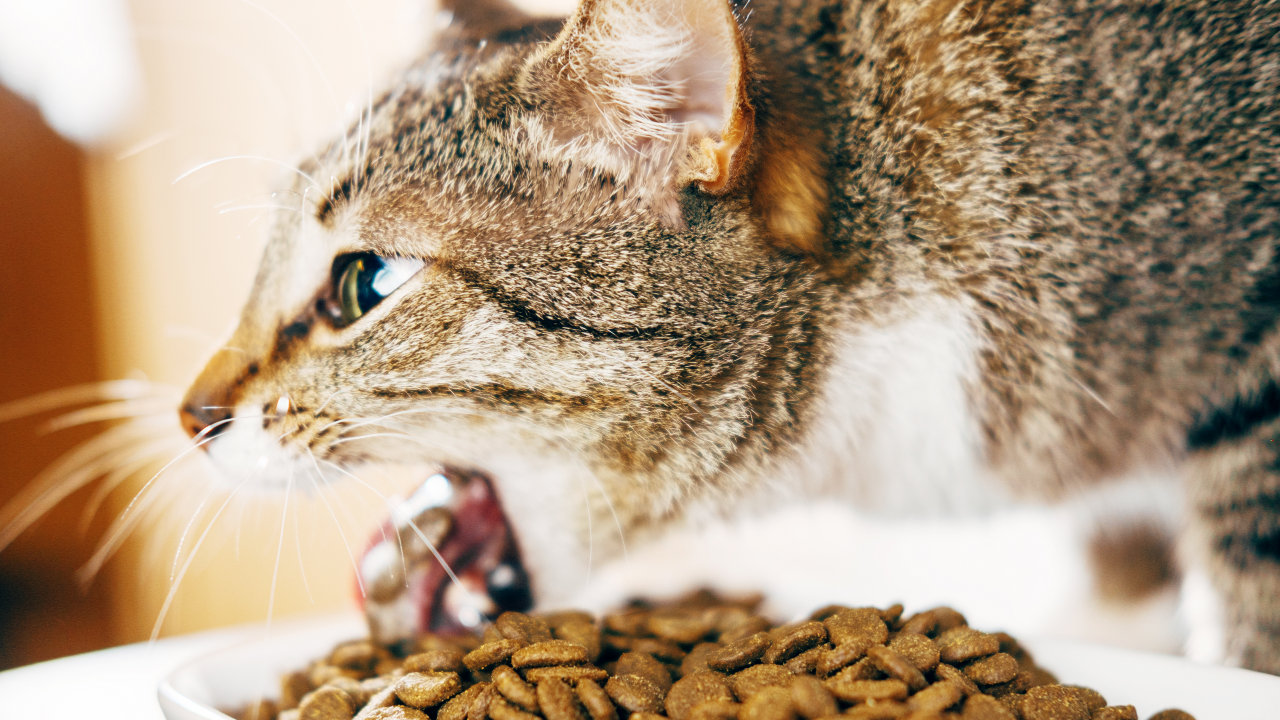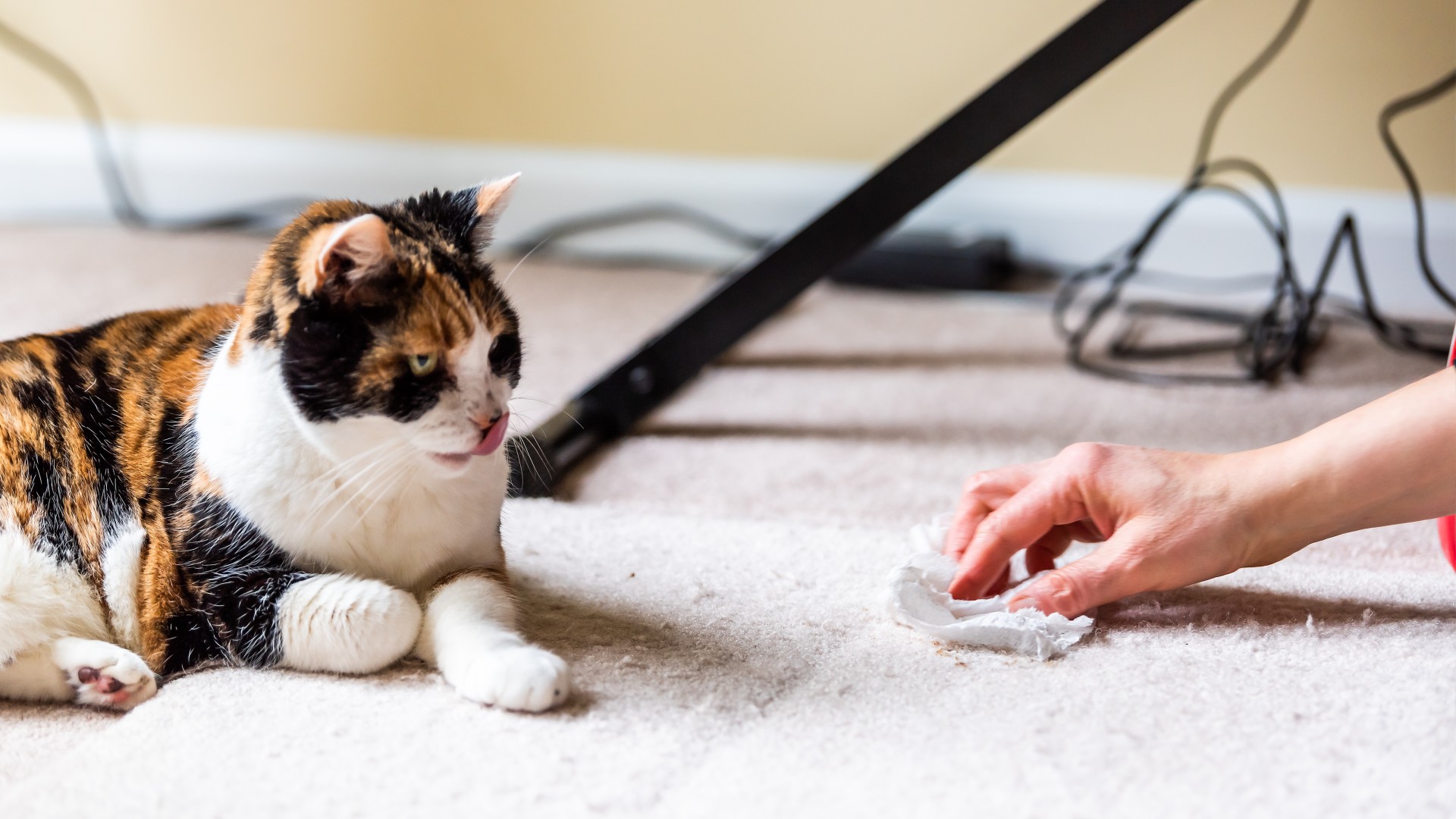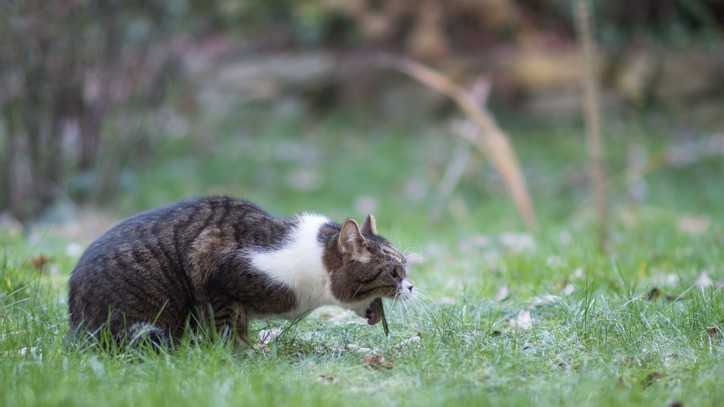Cat throwing up food after eating? We asked a vet what you can do
Our expert vet explains what you should do if your cat is throwing up food after eating

If your cat is throwing up food after eating then it’s natural to feel concerned. After all, vomiting is usually a sign that something is wrong although that doesn’t necessarily mean the cause is serious.
The main thing at this stage is getting to the bottom of the problem so that your cat can get the best care. That may be something you’re able to address at home or an issue that you feel is best looked after by a vet.
In this guide, our expert vet Dr Joanna Woodnutt takes us through the probable causes and when you should seek professional help. We also examine some products that could prevent the issue in the future.
Why is my cat throwing up after eating?
There are many reasons why your cat is throwing up after eating. Your pet may be:
- A bit too greedy: Eating too fast or eating too much can cause a kitty to vomit.
- Having trouble with fur balls: All cats suffer from occasional hairballs when grooming.
- Eating new food: There’s a knack for changing cat food safely.
- ‘Off’ his or her food: Cat not eating? It’s not always due to a fussy feline and is worth looking into.
- Stressed: Addressing anxiety in cats is important.
- Suffering a bowel obstruction: Ingesting a foreign body can cause an upset stomach in cats.
- Simply ill: Worms (intestinal parasites), inflammatory Bowel Disease (IBD), kidney disease, hyperthyroidism and cancer can cause cats to throw up after eating food.
When is vomiting a problem?
If your cat is vomiting after every meal, it suggests something severe is going on. On the other hand, cats who vomit occasionally after eating but otherwise seem well are less likely to be seriously ill. It’s important that you keep an eye on your cat even if they seem to be well, as vomiting cats can quickly deteriorate.
Why is my cat throwing up food but acting normal?
Cats are secretive creatures and they’ll often try to act normal no matter how sick they feel. If your cat is throwing up food but still acting normal they could still have an issue that needs support from a vet.

Why does my cat only throw up wet or dry food?
Sometimes you’ll notice your cat will only be sick after one type of food. This could be due to an intolerance to the food, but usually, it’s a simpler explanation. For many felines, wet cat food is a favorite.
Whilst they’ll graze on dry food all day, they’ll scarf down any wet food you provide as soon as it goes down on the floor – and then vomit it back up again. Try to work out if your cat throws up with all wet foods, or whether it’s a particular brand or flavor. You might want to look into best slow feeder cat bowls to stop your cat from eating so fast and vomiting.
When should I be concerned about my cat vomiting?
Knowing what to do if your cat is throwing up is important. The frequency of vomiting is important – if your cat vomits after eating just once, or it’s a rare occurrence (once a month or less often), then you can monitor them and bring it up with your vet at their next appointment.
If your cat is vomiting after eating at least once a week, you should book an appointment to visit your vet. And if your cat is vomiting more than once a day, or is unable to keep food down, you should make an urgent appointment with your veterinarian.
Look for other symptoms of being ill such as lethargy, diarrhea, or a poor appetite. If your cat is throwing up after eating but is otherwise acting normal, it’s unlikely to be an emergency, but you should still book a check-up with your vet if it’s more frequent than once a month.
When to visit your vet
It’s important to visit your vet if your cat shows signs of poor appetite, being hungry all the time, weight loss, thirst, more frequent urination, lethargy or diarrhea.

How to stop my cat from throwing up after eating
It’s hard to stop a cat from throwing up after eating unless you can find the cause of the problem but, for many cats, an identifiable cause is never found. Once you and your vet have ruled out some of the more serious diseases that can cause throwing up after eating, you could try these two potential solutions:
Slow your cat’s eating: ‘Scarf and barf’ is common so, for many cats, the cause of the vomiting is eating too much, too quickly. This sometimes happens with a particular flavor or type of food if your cat particularly enjoys one flavor over another. Try one of the best slow feeder cat bowls or one of the best anti-vomit cat bowls although there is no scientific evidence that anti-vomit cat bowls work.
Relieve stress: Consider ways to help your cat deal with their anxiety. Providing hiding places and reducing changes around the house can help your cat relax and keep their food down.
Want more cat content like this? Check out our features on what to do if your cat is throwing up white foam or acid reflux in cats.
PetsRadar Newsletter
Get the best advice, tips and top tech for your beloved Pets
After graduating as a vet from the University of Nottingham, Dr Joanna Woodnutt went on to practice companion animal medicine in the Midlands. Since then, she has also written for countless online and print publications and is a regular contributor for Edition Dog Magazine.

